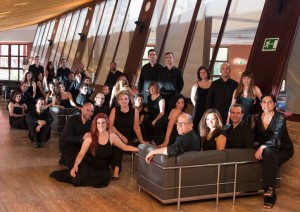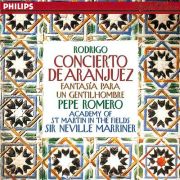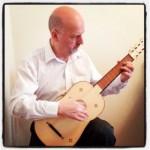Blog del Instituto Cervantes de Dublín
Torre Martello
La guitarra española de la mano de Ángel Lejarza y Salvador Andrades / The Spanish Guitar
El sonido de la guitarra siempre ha estado muy presente en el Instituto Cervantes de Dublín. Buena prueba de ello han sido los conciertos de Salvador Andrades, Alan Grundy, Ángel Lejarza, Juan José Manzano y Damià Timoner, celebrados durante el último año y medio en nuestro Café literario. A ellos se añaden talleres como el que estos días imparte en nuestro centro Lucas González. Y es que en el año en que hemos tenido que decir adiós, de forma inesperada, al gran maestro Paco de Lucía, la guitarra de raíces árabes que en España creció y evolucionó hasta convertirse en el instrumento que hoy todos conocemos, está más viva que nunca.
Así nos lo demuestra Ángel Lejarza durante la entrevista que nos concedió con motivo de su concierto a finales de 2013. En esta entrevista, Ángel hace un rápido recorrido por la historia de este instrumento que es hoy en día el más estudiado y tocado en todo el mundo. Las razones de su éxito son varias, y el propio Ángel las explica en este vídeo que ahora está a vuestra disposición en nuestro canal de Youtube.
Y del repertorio clásico de Ángel Lejarza, pasamos al repertorio flamenco de Salvador Andrades, entrevistado también por nuestra compañera Carmen Sanjulián hace unas semanas. Salvador, otro estupendo guitarrista, alumno de Antonio Sánchez (padre de Paco de Lucía) que ha trabajado junto a artistas como Camarón de la Isla, Fosforito o Tomatito, ha estado con nosotros durante todo este año derrochando simpatía y sabiduría a través de sus talleres y conciertos. Ahora, tras su experiencia irlandesa, vuelve a su tierra andaluza para seguir impartiendo sus clases magistrales y para seguir sacando sonidos nuevos a su guitarra. En la entrevista que ahora que acabamos de editar nos habla precisamente de su paso por Irlanda, de sus proyectos y, por supuesto, de guitarra y de flamenco. ¡Muchas gracias Salvador, y hasta pronto!
The sound of guitar has always been very present at the Instituto Cervantes Dublin. Proof of this were the concerts of Salvador Andrades, Alan Grundy, Ángel Lejarza, Juan Jose Manzano and Damià Timoner, held during the last year and a half in our Café Literario.We also have workshops like the one that musician Lucas González is teaching these days. And in the year that we had to bid farewell, unexpectedly, to the great master Paco de Lucia, the guitar of Arabian roots that in Spain grew and evolved into the instrument that we all now know, is more alive than ever.
Ángel Lejarza proves it during the interview on the occasion of his concert at Instituto Cervantes in late 2013. In this interview, Ángel does a brief tour of the history of this instrument, which is today the most studied and performed worldwide. The reasons for its success are many, and Ángel explains them in this video that is now available to you on our Youtube channel.
And from Ángel Lejarza’s classical repertoire to the flamenco repertoire by Salvador Andrades, also interviewed by our colleague Carmen Sanjulián a few weeks ago. Salvador, another great guitarist, student of Antonio Sánchez (Paco de Lucia’s father) has worked with artists such as Camarón de la Isla, Tomatito or Fosforito. He has been with us throughout this year overflowing sympathy and wisdom in his workshops and concerts.
Now, after his Irish experience, he returns to his hometown to keep teaching his master classes and keep bringing new sounds to his guitar. In the interview that we have just edited, he talks about his experiences in Ireland, his projects, and of course, guitar and flamenco.Thank you very much, Salvador and see you soon!
Concierto: Coro Universidad Carlos III de Madrid | Concert: The Choir from the Carlos III University of Madrid
 Si hoy quieres escuchar buena música no tienes más que venir esta tarde al concierto que el coro de la Universidad Carlos III de Madrid nos ofrece a las 7.30pm en el Café Literario.
Si hoy quieres escuchar buena música no tienes más que venir esta tarde al concierto que el coro de la Universidad Carlos III de Madrid nos ofrece a las 7.30pm en el Café Literario.
El Coro de la Universidad Carlos III de Madrid comienza su andadura en noviembre de 1990. La dirección musical corre a cargo de Nuria S. Fernández Herranz, y la gestión y coordinación de Félix Márquez.
A lo largo de su historia, ha colaborado en la recuperación del Patrimonio Musical Español con la interpretación de obras de Jaume Casellas (1690-1764) y Antonio Soler (1729-1783), y ha estrenado numerosas obras de compositores contemporáneos españoles como Javier Busto, Alicia Santos, Asís Márquez y Albert Alcaraz. El Coro UC3M ha realizado giras por Portugal, Holanda, Cuba y Hungría. Ha obtenido diversos galardones en concursos nacionales entre los que cabe destacar su reciente Premio “Ciudad de Torrevieja 2012” en el Certamen Internacional de Habaneras y Polifonía de dicha localidad.
En 2012 presenta una ecléctica selección de programas entre los que destacan Dixit Dominus yCoronation Anthems de Haendel, la Misa de Coronación de Mozart y el espectáculo escénico-coral EnAmorArte de Lorca basado en textos del autor granadino puestos en música por compositores españoles contemporáneos.
En estos días, el Coro se encuentra en Dublín realizando un Taller de Interpretación con el director y compositor Michael McGlynn. No queríamos dejar pasar la ocasión de mostrar parte de la creación musical para coro de compositores españoles y, por ello, les ofrecemos este concierto dedicado a la música española.
If you want to listen to some good music you can enjoy today a concert by the Choir from the Carlos III University of Madrid. This event will be at 7.30pm at Café Literario.
The Choir from the Carlos III University of Madrid was set up in November 1990. Nuria S. Fernández Herranz is in charge of their musical direction, while Félix Márquez is responsible for their management.
Throughout its career, the choir´s interpretation of the works of Jaume Casellas (1690-1764) and Antonio Soler (1729-1783) has contributed to the preservation of Spanish musical heritage, and it has showcased numerous works of contemporary Spanish composers such as Javier Busto, Alicia Santos, Asís Márquez y Albert Alcaraz. The UC3M choir has toured Portugal, Holland, Cuba and Hungry and has received numerous awards in national competitions. The most outstanding award they have received to date is the recent honour, ‘City of Torrevieja 2012’, in the International Competition of Habaneras and Polifany.
In 2012 the choir presented an eclectic range of programs, most notably Dixit Dominus and Handel´s Coronation Anthems, The Coronation Mass by Mozart and the spectacular choral performance EnAmorArte de Lorca, based on texts by the author from Granada, set to music by contemporary Spanish composers.
The choir is currently in Dublin taking part in a performance workshop with the director and composer Michael McGlynn. To mark this occasion and demonstrate the musical achievements of Spanish choral composers, we invite you to attend a concert dedicated to Spanish music by the UC3M choir.
Concierto: La guitarra española: Un viaje imaginario por España de la mano de la guitarra española de Angel | Concert: La guitarra española: An imaginary trip around Spain guided by Angel’s Spanish Guitar
El guitarrista Angel nos trae un gran repertorio en guitarra clásica española esta tarde a las 20:00 en el Café Literario. Si deseas asistir a este concierto, envía un correo electrónico a reservas.dublin@cervantes.es
Tras años de investigación sobre la música y tradiciones españolas, el desarrollo de una interpretación de música de siempre va tomando forma y el sonido de España emana de las seis cuerdas de un instrumento que describe el alma española. Angel presenta la música de algunos de los grandes compositores españoles como Enrique Granados, Joaquín Malats, Francisco Tárrega, Manuel de Falla e Isaac Albéniz en este concierto dedicado a la guitarra española.
Las representaciones de Angel han tenido gran aceptación en la comunidad artística y público general irlandeses y europeos. Los amantes de la cultura española lo sitúan en un lugar privilegiado por su interpretación personal de la música española. Su técnica embellece su música con la impresionante expresividad de su repertorio y conciencia lírica.
The guitar player Angelwill bring us today a great repertoire of Spanish classical guitar. This great gig will be at 8 pm at Café Literario. If you wish to attend this concert, send an e-mail to: reservas.dublin@cervantes.es
Through many years of research into Spanish music and traditions, the development of an interpretation into old favourites has taken shape little by little and the sounds of Spain flows from the six strings of the instrument that describes the soul of Spain. Angel presents the music of some of the greatest Spanish composers like Enrique Granados, Joaquín Malats, Francisco Tárrega, Manuel de Falla and Isaac Albéniz in
this concert dedicated to La Guitarra Española.
Angel’s performances have had a great impact on general audiences and on the artistic community in Ireland and Europe alike. His interpretations of Spanish music make him a preferred choice for audiences captivated by the Spanish culture. His powerful expressive range and his lyrical awareness are remarkable.
La biblioteca propone / The library suggests: La guitarra española
 Este mes tenemos concierto de guitarra en el Instituto Cervantes de Dublín. Por eso nos ha parecido una buena idea dedicar el tema del mes a la guitarra española y a nuestra colección de discos sobre este instrumento.
Este mes tenemos concierto de guitarra en el Instituto Cervantes de Dublín. Por eso nos ha parecido una buena idea dedicar el tema del mes a la guitarra española y a nuestra colección de discos sobre este instrumento.
¿Sabes cuál es su origen? La teoría más extendida dice que su antecesor directo es el ud, instrumento llevado a España por los árabes después de su llegada en el siglo VIII, aunque hay estudios que afirman que debe descender de los instrumentos romanos tanbur o de la cithara.
En todo caso, para escuchar a sus mejores intérpretes y compositores, tan solo tienes que acercarte a nuestra biblioteca. Aquí está a tu disposición la música de Isaac Albéniz, de Andrés Segovia, de Paco de Lucía, Raimundo Amador, y de muchos otros que han hecho de la guitarra española un referente a nivel internacional.
Our topic of the month is dedicated to the most representative musical instrument of Spanish culture: the guitar.
The most popular theory is that its predecessor was the ud, an instrument brought to Spain by the Arabs after they invaded the country in the 8th century. Although there are studies that state that its origin comes from the tanbur or cithara brought by the Romans to Spain 400 A.D.
Whichever the origin may be, the guitar has evolved throughout the years until reaching its technical and creative splendour in the 20th century, which is considered to be the golden age of the Spanish classical guitar.
Concierto de guitarra clásica / Classic guitar concert: Inspiración española de Alan Grundy / Spanish Inspirations by Alan Grundy
Con motivo del Día de la Hispanidad, el Instituto Cervantes de Dublín se complace en presentar de nuevo sobre su escenario del Café Literario al afamado guitarrista clásico irlandés Alan Grundy. Te esperamos hoy día 11 de octubre a las 20:00 h en el Café Literario.
escenario del Café Literario al afamado guitarrista clásico irlandés Alan Grundy. Te esperamos hoy día 11 de octubre a las 20:00 h en el Café Literario.
Inspiración Española – un recital de guitarra a cargo del guitarrista Alan Grundy, compuesto por piezas inspiradas en el baile, la canción, la poesía, la pintura, los nombres y lugares de España. Desde danzas cortesanas de los siglos XVI y XVII de los compositores Diego Pisador, Alonso Mudarra y Gaspar Sanz (tocadas por Alan con vihuela y guitarra barroca) a piezas del siglo XIX de Albéniz y Tárrega inspiradas en nombres y lugares de España. El repertorio incluye también dos piezas originales compuestas por Alan Grundy, Día de España y The Old Guitarrist / La Guitarra.
Entradas: 15 /10 € SRC: reservas.dublin@cervantes.es
On the occasion of the near-coming Spanish National Day, Instituto Cervantes Dublin is delighted to bring again on stage renowned Irish classical guitarist Alan Grundy. The concert is today at 8.00pm at our Café Literario.
‘Spanish Inspiration’ – A Guitar Recital by guitarist Alan Grundy featuring guitar works inspired by Spanish Dance, Song, Poetry, Painting, Names and Places. From Court Dances of the 16th and 17th Centuries by Diego Pisador, Alonso Mudarra and Gaspar Sanz (played by Alan on Vihuela and Baroque Guitar), to 19th Century pieces inspired by Spanish names and places by Albeniz and Tarréga. The Recital will also feature two original works by Alan Grundy – Dia de España and The Old Guitarist / La Guitarra.
Tickets: 15 /10 € RSVP: reservas.dublin@cervantes.es




